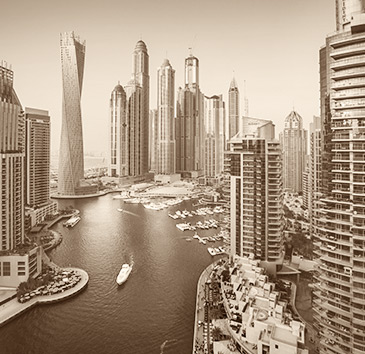A variety of reasons can influence the decision to purchase real estate. Regardless of whether the property is bought to be used as a residence, investment or holiday home, a buyer is well-advised to ensure - prior to signing any contractual documents - that he has done his homework by examining all aspects of the actual and financial feasibility of the transaction. The purchase of real estate in the Emirate of Dubai should, therefore, be preceded by a close examination of all relevant factors, such as location, availability, value and condition of the property, as well as the applicable underlying legal framework.
1. Eligibility to purchase real estate
The persons eligible to own real estate in the Emirate of Dubai and to be registered as such are determined by Dubai Law No. 7 of 2006 as amended. In general, only Emirati nationals and companies owned in full by Emirati nationals, local public joint stock companies as well as other GCC nationals are permitted to unrestrictedly own property in Dubai. Foreign nationals and companies with foreign shareholding and registered addresses in Dubai are only allowed to purchase real estate in so-called freehold zones. However, legal entities registered in other Emirates or abroad cannot be registered as owners of properties located in the Emirate of Dubai since the respective regulations were amended accordingly several years ago. Legal entities, whose ownership was registered prior to this change in law, are not affected therefrom and enjoy legal protection.
The nationality of the buyer thus essentially determines whether and where he is qualified to purchase real estate. Depending on the specific case, the age of the purchaser or, respectively, the corporate structure of a corporate entity can become relevant. In the latter case for example, one must ensure that the documentation identifying the ultimate beneficial owner(s) is complete and meets the requirements of the concerned authority, i.e. the Dubai Land Department ("DLD"), in terms of form and content.
2. Eligibility to sell real estate
Conversely, the seller of the chosen property must be able to transfer ownership thereof to a third party. The same holds true for the submission of any documents requested from the seller by the DLD. In case that the seller is unable to provide such documentation for actual or legal reasons, it may render the property virtually unsaleable.
From the buyer's perspective, the ownership of the seller should be determined with absolute certainty. With regard to an already completed project, the buyer should demand to review the original title deed issued for the particular premises. Should, at the beginning of the negotiations, only a copy of the title deed have been made available, the buyer can, provided that the seller approves, verify the authenticity and validity of the title deed with the DLD.
It should also be noted that the buyer generally attains the rights and obligations of the seller, including existing tenancies and easements.
Should the buyer be interested in purchasing a property off-plan, the proper registration of the project by the developer must be confirmed. Furthermore, it has to be an active development. Ownership of an inactive or cancelled project cannot be acquired. The status of a project can be reviewed on the DLD's website.
3. Availability, condition and value of real estate
In case that an off-plan property shall be purchased, the intended date of completion as well as the generally agreed option of the developer to extend the same should be taken into consideration. This aspect gains particular importance should the buyer intend to make use of his property from a certain date onward. Analogously, this might also become applicable when purchasing a finished property. In such cases, issues regarding existing tenancies and, if required, the possibility of their termination become relevant.
The actual size and technical features of the chosen premises, the condition as well as the lawful constructions of annexes and alterations should be verified by the buyer during an inspection. In doing so, potential deficiencies and shortcomings that could influence the value of the property and/or its subsequent usability can be ruled out.
Regarding the current value of the real estate, the buyer should acquaint himself with the applicable pricing structures of the local real estate market in order to determine whether the asking price is realistic and should, if necessary, have the purchase price confirmed by either the DLD or any external provider.
Particular importance should be attributed to this aspect in case that the property purchase is financed since the value of the property substantially determines the amount of the loan to be taken out. The assessment of the property value by the bank, however, quite often significantly deviates from the asking price of the seller.
4. Financing a real estate purchase
In general, investors should always stay within their budget and should only conclude such transactions which remain economically viable even if the market value of the property decreases.
Based on a comprehensive market analysis and the determination of all factors influencing the value of the property, the profitability of the endeavour must be assessed before any transaction is conducted. Part of such review should entail the perusal of the available financing options, in particular whether and under which circumstances loans can be obtained and mortgages registered. When taking out a loan or registering a mortgage, the strict requirements issued by the UAE Central Bank as well as the DLD must be met. In this regard, maximum financing limits, registration prerequisites for mortgages, the identity of the lender, the nationality and the age of the borrower and mortgagor as well as the property's stage of completion must be observed.
Buyers regularly disregard the fact that the costs of a real estate transaction do not only comprise of the purchase price but also include fees for the actual transfer of ownership at the DLD, fees payable to the involved real estate brokers as well as the costs for the issuance of the required documentation. When calculating the total costs and drafting the financial budget, investors should exercise caution since such additional costs are usually not covered by a loan.
5. Contractual Documents
The contractual documents regarding a property purchase should only be prepared after the buyer has clarified the aforementioned aspects to his full satisfaction. Naturally, it is imperative to carefully review the contractual documents in their entirety, including appendices.
Regarding the successful execution of a purchase, the buyer should also direct his attention to the deadlines usually agreed upon in purchase agreements during which the transaction must be concluded. It is not uncommon that such periods are insufficient to obtain all documents needed which can lead to unnecessary complications.
6. Conclusion
A thorough analysis of the local real estate market, the specific subject of purchase as well as the financial risks should forego the purchase of a property in the Emirate of Dubai. The accurateness of the review of all relevant factors has a direct impact on the straightforwardness of the subsequent conclusion of the transaction. Therefore, all significant inquiries should be made shortly before the intended transfer date in order to ensure that the relevant details have not significantly changed in the meantime.

